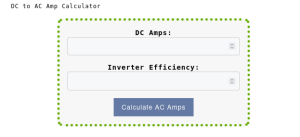DC to AC Amp Calculator
DC to AC Amp Calculator
DC to AC Amp Calculator
The DC to AC Amp Calculator is a tool that allows you to calculate the equivalent AC Amps based on the DC Amps and the efficiency of an inverter. It is commonly used in electrical systems that involve converting DC power to AC power, such as in solar panel installations or power inverters for mobile applications.
Try out our Angles of Parallel Lines With Algebra Calculator
Formula and Calculation:
The calculation in the DC to AC Amp Calculator is based on the following formula:
AC Amps = DC Amps / Inverter Efficiency
In this formula, “AC Amps” represents the output alternating current (AC) amperage, “DC Amps” represents the input direct current (DC) amperage, and “Inverter Efficiency” represents the efficiency of the inverter.
To calculate the AC Amps, you divide the DC Amps by the Inverter Efficiency. The result gives you an estimate of the equivalent AC amperage that would be required to produce the same power output as the given DC Amps.
Example:
Let’s consider an example where the DC Amps is 10 and the Inverter Efficiency is 0.9 (90%). Using the formula, we can calculate the AC Amps as follows:
AC Amps = DC Amps / Inverter Efficiency
AC Amps = 10 / 0.9
AC Amps ≈ 11.11
In this example, the calculated AC Amps is approximately 11.11. This means that in order to produce the same power output as 10 DC Amps with an inverter efficiency of 90%, you would need approximately 11.11 AC Amps.
FAQs:
- What is the purpose of the Inverter Efficiency in the calculation? The Inverter Efficiency represents the efficiency or effectiveness of the inverter in converting DC power to AC power. It accounts for the energy losses during the conversion process. A higher inverter efficiency indicates a more efficient conversion, resulting in a lower AC Amps requirement for a given DC Amps input.
- Can I use the DC to AC Amp Calculator for different electrical systems? Yes, the DC to AC Amp Calculator can be used for various electrical systems where DC power is converted to AC power using an inverter. It is commonly used in applications such as solar power systems, off-grid power solutions, and mobile power inverters.
- What other factors should I consider besides AC Amps in practical applications? While the AC Amps value is important, there are other factors to consider for proper system design and operation. These factors include voltage requirements, power factor, surge currents, wiring capacity, and safety regulations. It’s essential to consult relevant electrical standards and guidelines and consider professional advice when working with electrical systems.

